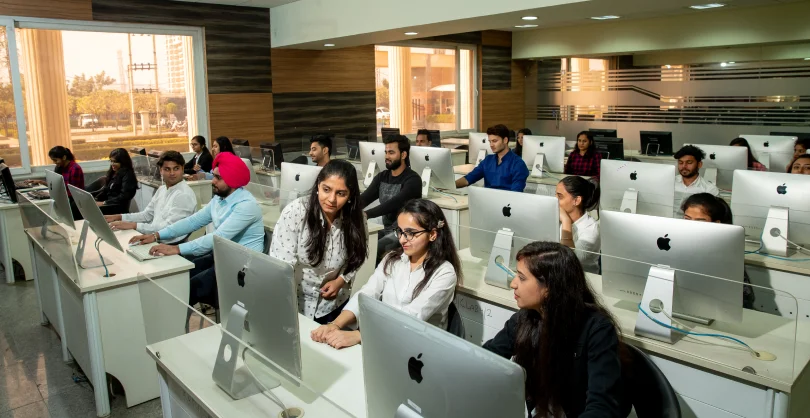OVERVIEW
The M.Tech in CSE programme is more than just an academic journey; it’s a platform for students to engage in groundbreaking research, develop cutting-edge technologies, and contribute significantly to the tech community. Upon graduation, our alumni are not only ready to excel in various technology-driven industries but are also equipped to drive change and lead in an increasingly digital world.

Programme Highlights
Exploring the Foundations of
Technological Excellence
Our curriculum for the M.Tech in Computer Science and Engineering is meticulously designed to keep pace with the ever-changing terrain of the digital world. It seamlessly blends core principles of computer science with cutting-edge technological developments. This approach guarantees a holistic and progressive learning experience, equipping graduates to thrive in the dynamic field of technology.
Programme Structure
- Mathematical Foundations of Computer Science
- Data Structures & Algorithums
- Research Methodology and IPR
- Discipline Specific Elective-I
- Machine Learning OR
- Wireless Sensor Networks OR
- Introduction to Intelligent Systems
- Discipline Specific Elective-II
- Data Science OR
- Distributed Systems OR
- Advanced Wireless & Mobile Networks
- Discipline Specific Elective-II Lab
- Data Science Lab OR
- Distributed Systems Lab OR
- Advanced Wireless & Mobile Networks Lab
- Data Structures and Algorithms Lab
- Advance Algorithms
- Soft Computing
- Discipline Specific Elective-III
- Data Preparation & Analysis OR
- Secure Software Design & Enterprise Computing OR
- Computer Vision
- Discipline Specific Elective-III Lab
- Data Preparation & Analysis Lab OR
- Secure Software Design & Enterprise Computing Lab OR
- Computer Vision Lab
- Discipline Specific Elective-IV
- Human & Computer Interaction OR
- GPU Computing OR
- Digital Forensics
- Soft Computing Lab
- Minor Project
- Discipline Specific Elective-V
- Mobile Applications and Services OR
- Compiler for HPC OR
- OptimizationTechniques
- Open Elective
- Dissertation-I / Industrial Project
- Dissertation-II / Industrial Project
Connecting Talent to Dream Careers
K.R. Mangalam University has a promising association and collaboration with various industry giants like Infosys, Wipro, TCS, Accenture, Genpact, and many more to offer students a chance to get industry exposure and get a secured position in the market and earn a good salary package.
Career Options
Our M.Tech CSE programme paves the way for graduates to dive into a diverse range of advanced and exhilarating career paths within the tech industry. Those who complete this programme are thoroughly equipped with both the deep knowledge and the specialized skills required to excel in various high-level, dynamic fields. Here, we spotlight five prominent career trajectories for our M.Tech graduates, while recognizing the abundance of other exciting opportunities that await in the technological realm:
Programme
Outcomes
PO1. Engineering knowledge:
Apply the knowledge of mathematics, science, engineering fundamentals, and an engineering specialization to the solution of complex engineering problems.
01
PO2. Problem analysis
Identify, formulate, review research literature, and analyze complex engineering problems reaching substantiated conclusions using first principles of mathematics, natural sciences, and engineering sciences.
02
PO3. Design/development of solutions:
Design solutions for complex engineering problems and design system components or processes that meet the specified needs with appropriate consideration for the public health and safety, and the cultural, societal, and environmental considerations.
03
PO4. Conduct investigations of complex problems:
Use research-based knowledge and research methods including design of experiments, analysis and interpretation of data, and synthesis of the information to provide valid conclusions.
04
PO5. Modern tool usage:
Create, select, and apply appropriate techniques, resources, and modern engineering and IT tools including prediction and modeling to complex engineering activities with an understanding of the limitations.
05
PO6. The engineer and society:
Apply reasoning informed by the contextual knowledge to assess societal, health, safety, legal and cultural issues and the consequent responsibilities relevant to the professional engineering practice.
06
PO7. Environment and sustainability:
Understand the impact of the professional engineering solutions in societal and environmental contexts, and demonstrate the knowledge of, and need for sustainable development.
07
PO8. Ethics:
Apply ethical principles and commit to professional ethics and responsibilities and norms of the engineering practice.
08
PO9. Individual and team work:
Function effectively as an individual, and as a member or leader in diverse teams, and in multidisciplinary settings.
09
PO10. Communication:
Communicate effectively on complex engineering activities with the engineering community and with society at large, such as, being able to comprehend and write effective reports and design documentation, make effective presentations, and give and receive clear instructions.
10
PO11. Project management and finance:
Demonstrate knowledge and understanding of the engineering and management principles and apply these to one’s own work, as a member and leader in a team, to manage projects and in multidisciplinary environments.
11
PO12. Life-long learning:
Recognize the need for, and have the preparation and ability to engage in independent and life-long learning in the broadest context of technological change.
12
PEO1
Develop knowledge and abilities in the area of Computer Science and Engineering and create a foundation of lifelong learning to facilitate progressive careers in industry and in pursuit of higher studies.
01
PEO2
To provide our students with the technical and analytical abilities they need to create creative solutions to challenging real-world issues using both current and emerging technology.
02
PEO3
To provide our students with the necessary communication and interpersonal skills, multidisciplinary teamwork, and leadership abilities so they can achieve their professional obligations.
03
PEO4
To make students aware of current concerns so they can develop morals and sense of responsibility for themselves, their coworkers, society, and the nation
04
PSO1
Acquire a comprehensive understanding of the fundamental principles, theories, and practices in Computer Science and Engineering, enabling graduates to apply their knowledge effectively in various professional settings.
01
PSO2
Demonstrate proficiency in utilizing current and emerging technologies to analyze and solve complex real-world problems in the field of Computer Science and Engineering. Graduates should be capable of developing innovative solutions and adapting to technological advancements.
02
PSO3
Develop strong communication and interpersonal skills, including the ability to collaborate effectively in multidisciplinary teams, present technical information clearly, and engage in professional discussions. Graduates should also demonstrate leadership qualities and be able to assume responsibilities in their chosen field.
03
PSO4
Cultivate a sense of ethics, social responsibility, and awareness of current concerns in the field of Computer Science and Engineering. Graduates should understand the importance of ethical practices, sustainable development, and contribute positively to their workplace, society, and the nation.
04
Financial Assistance
K.R. Mangalam University partnered with the leading banks to help you to finance your dream course through Education Loan. You only have to start repaying one year after finishing your course or six months after you get a job.
Frequently Asked Questions
Commence Your Journey
in 6 Simple Steps

Complete payment and submit
Pay the required Application Fee
Take an entrance test
K.R. Mangalam University Entrance Examination (KREE)
Appear for interaction
Attend our Faculty-Led Interview.
Get the admission offer
You will receive the offer letter after the successful interaction
Get Enrolled
Be prepared to embark on your journey














